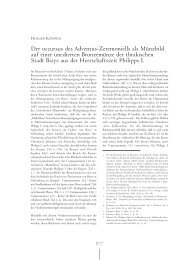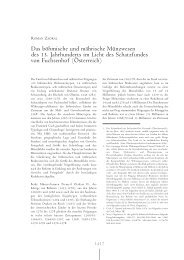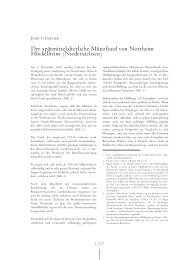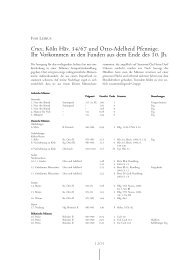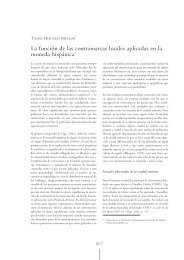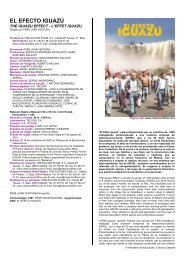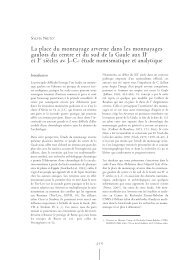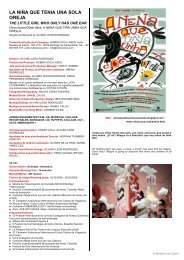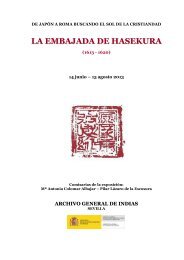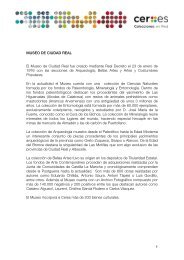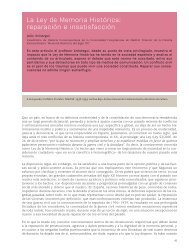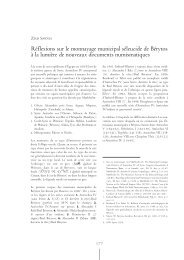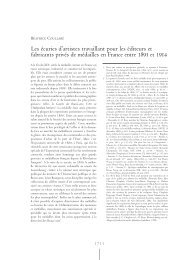Study on the use of subtitling
Study on the use of subtitling
Study on the use of subtitling
You also want an ePaper? Increase the reach of your titles
YUMPU automatically turns print PDFs into web optimized ePapers that Google loves.
The <strong>use</strong> <strong>of</strong> <strong>subtitling</strong> as an educati<strong>on</strong>al tool in learning or improving mastery <strong>of</strong> languages is also<br />
reinforced by <strong>the</strong> results <strong>of</strong> <strong>the</strong> questi<strong>on</strong>naire-based survey, which dem<strong>on</strong>strates <strong>the</strong> European<br />
populati<strong>on</strong>'s c<strong>on</strong>fidence in <strong>the</strong> educati<strong>on</strong>al potential <strong>of</strong> <strong>subtitling</strong> 26 .<br />
Figure 5 – The age groups: Do you think that <strong>subtitling</strong> can improve your knowledge <strong>of</strong> foreign languages?<br />
The pers<strong>on</strong>s surveyed also expressed <strong>the</strong>ir willingness to watch films in <strong>the</strong> original language<br />
with subtitles if <strong>the</strong>se were broadcast by televisi<strong>on</strong> channels 27 .<br />
The availability <strong>of</strong> such programmes can c<strong>on</strong>stitute a favourable envir<strong>on</strong>ment for <strong>the</strong> <strong>use</strong> <strong>of</strong><br />
<strong>subtitling</strong> as an educati<strong>on</strong>al tool for language learning 28 .<br />
5.2 Knowledge <strong>of</strong> foreign languages and preference for dubbing or<br />
<strong>subtitling</strong><br />
5.2.1 General results<br />
The majority <strong>of</strong> European students surveyed (5 172 pers<strong>on</strong>s) 29 prefer to watch films in a foreign<br />
language <strong>the</strong>y know in <strong>the</strong> original versi<strong>on</strong>, without subtitles (30%) or with subtitles (49%), while<br />
<strong>on</strong>ly 21% <strong>of</strong> this populati<strong>on</strong> opts for <strong>the</strong> dubbed versi<strong>on</strong>. The students who choose <strong>the</strong> original<br />
versi<strong>on</strong> (with or without <strong>subtitling</strong>) state that <strong>the</strong>y wish to see films in <strong>the</strong>ir semiological integrity,<br />
i.e. as c<strong>on</strong>ceived by <strong>the</strong> director, or else to practice <strong>the</strong> foreign languages <strong>the</strong>y know. Some<br />
never<strong>the</strong>less say this choice is due to habit. Students who prefer dubbing are motivated by habit,<br />
toge<strong>the</strong>r with <strong>the</strong> wish to avoid making <strong>the</strong> effort required to read subtitles.<br />
26<br />
68.7% <strong>of</strong> survey resp<strong>on</strong>dents said that <strong>subtitling</strong> can improve knowledge <strong>of</strong> foreign languages. See<br />
Annex 4.<br />
27<br />
71.8% <strong>of</strong> resp<strong>on</strong>dents. See Annex 4.<br />
28<br />
See C<strong>on</strong>clusi<strong>on</strong>s below.<br />
29<br />
5 172 students surveyed, including 3 122 from language faculties and 1 850 from n<strong>on</strong>-language<br />
faculties. The total also includes 117 students whose mo<strong>the</strong>r t<strong>on</strong>gue is different from that <strong>of</strong> <strong>the</strong><br />
community where <strong>the</strong>y live and 83 bilingual students. The latter two categories were analysed separately.<br />
See Annex 4.<br />
FINAL REPORT- JUNE 2011 Media C<strong>on</strong>sulting Group -- page 18



